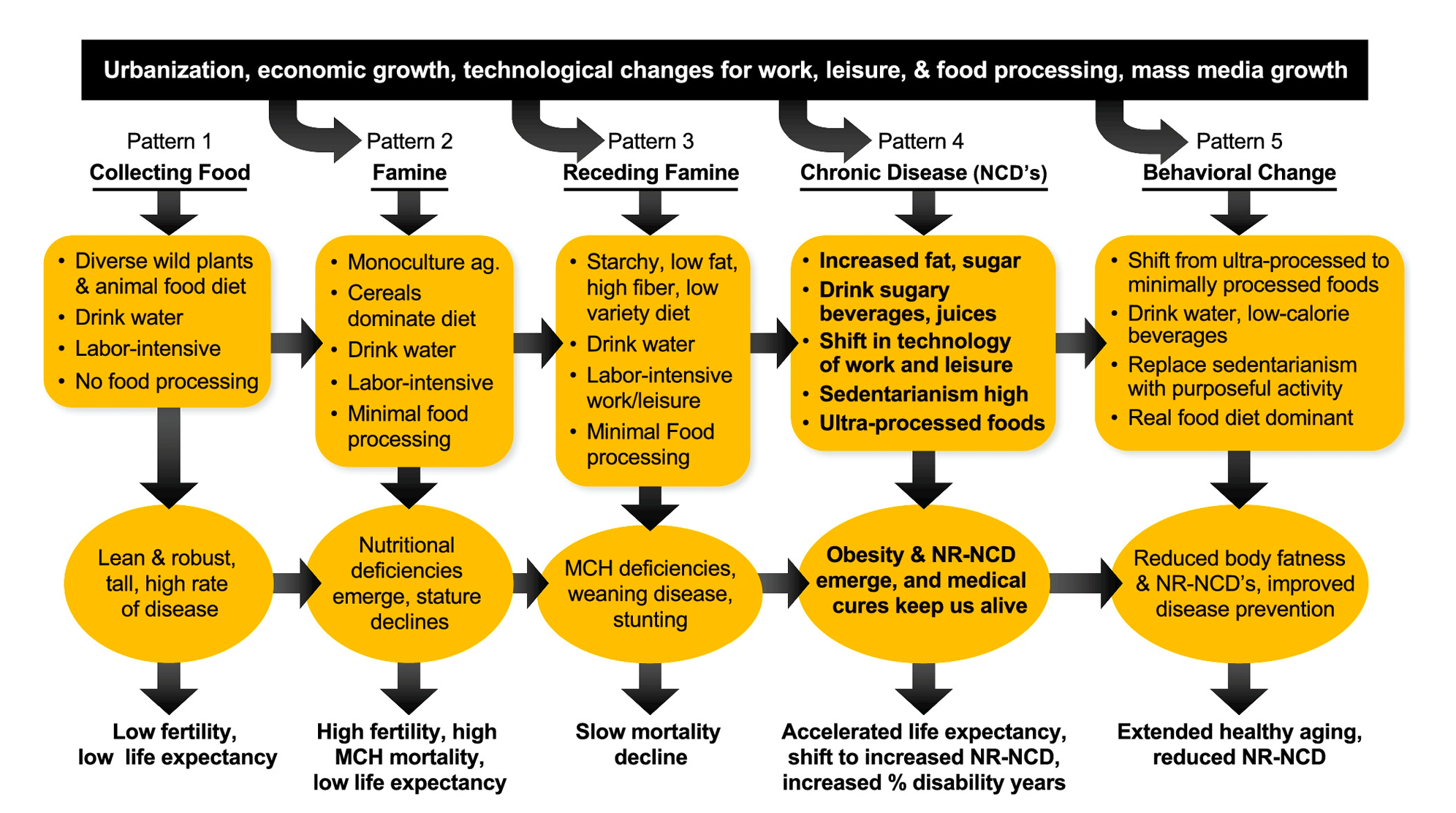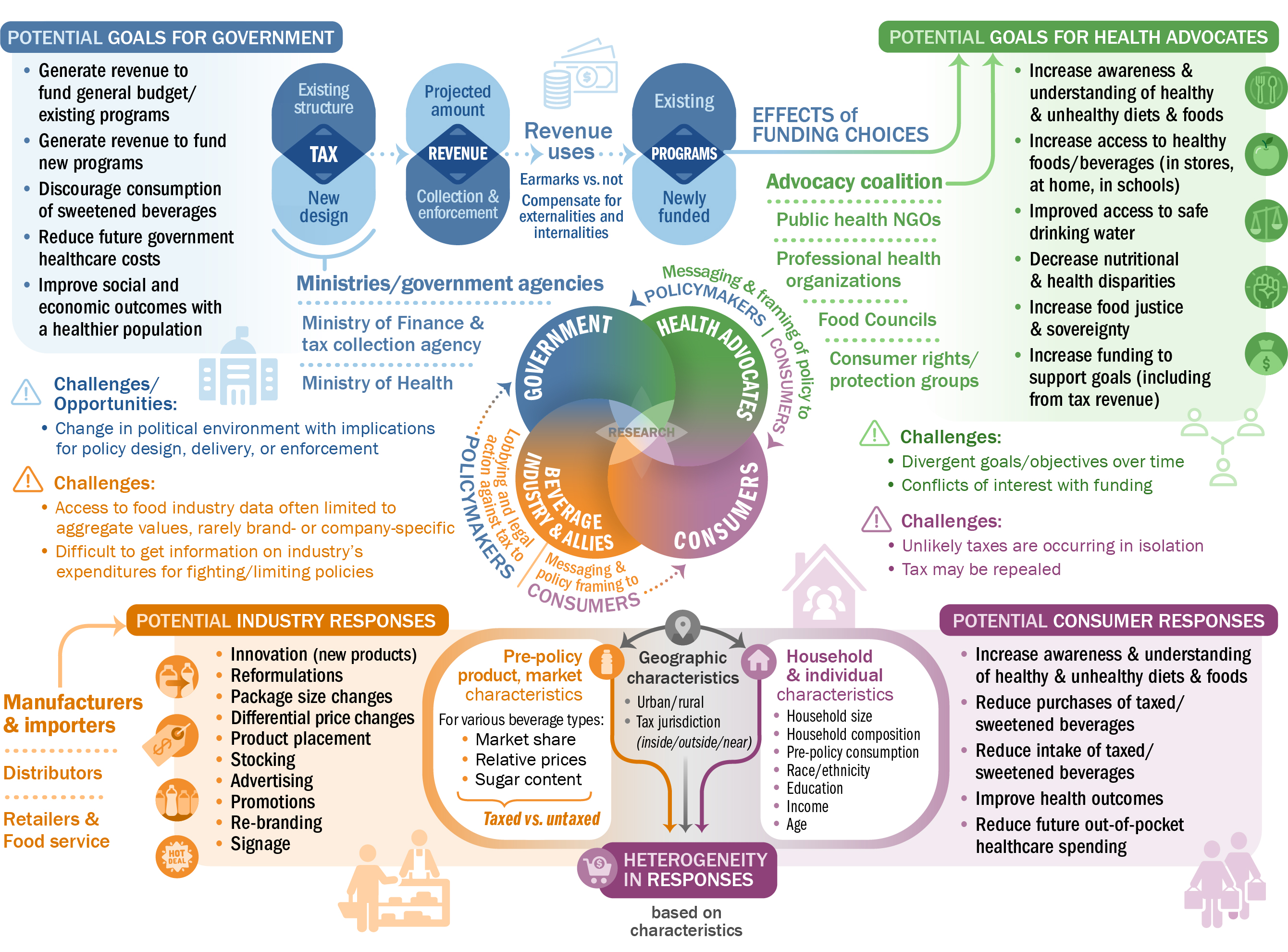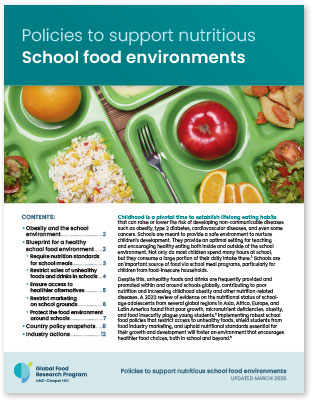
The GFRP team collectively or individually has been involved in research spanning regions and countries at all income levels and including studies on diet, physical activity, overweight/obesity, and broader food system-related issues. Policy work includes the World Bank obesity strategy coauthored by Barry Popkin and Meera Shekar (Obesity : Health and Economic Consequences of an Impending Global Challenge), regional studies on food systems and obesity by Popkin and Tom Reardon and others (e.g., in Latin America and Africa), background documents for initiatives on physical activity, and Bellagio meetings.
Reviews include a narrative review of governmental regulations to restrict unhealthy food marketing to children, and a scoping review on front-of-package warning labels.
GFRP Team Lead
Resources
-
 This fact sheet describes how front-of-package labels can help consumers make informed, healthier choices and encourage industry to improve the nutritional profile of their products and portfolios. Learn about the different kinds of front-of-package labels in use around the world today, evidence for different label types, and key considerations and best practices for developing and implementing an effective front-of-package labeling policy.
This fact sheet describes how front-of-package labels can help consumers make informed, healthier choices and encourage industry to improve the nutritional profile of their products and portfolios. Learn about the different kinds of front-of-package labels in use around the world today, evidence for different label types, and key considerations and best practices for developing and implementing an effective front-of-package labeling policy. -
 Global maps showing countries and smaller jurisdictions with taxes on sugary or sweetened beverages and/or foods high in nutrients or ingredients of health concern. These taxes aim to curb intake of sugar, salt, saturated or trans fat, or excessive calories to improving public health; to encourage industry to shift their products and portfolios towards healthier products; and to raise revenue. Included are brief descriptions of each tax design and dates of implementation and updates.
Global maps showing countries and smaller jurisdictions with taxes on sugary or sweetened beverages and/or foods high in nutrients or ingredients of health concern. These taxes aim to curb intake of sugar, salt, saturated or trans fat, or excessive calories to improving public health; to encourage industry to shift their products and portfolios towards healthier products; and to raise revenue. Included are brief descriptions of each tax design and dates of implementation and updates. -
Comments for WHO consultation on the draft fiscal policy guidelines
 The Global Food Research Program submission to World Health Organization's public consultation on draft guidelines on fiscal policies to promote healthy diets
The Global Food Research Program submission to World Health Organization's public consultation on draft guidelines on fiscal policies to promote healthy diets -
Taxing sugary drinks: A fiscal policy to improve public health
 Learn about the connections between excess sugar consumption and prevalence of obesity and other noncommunicable diseases, as well as real-world evidence for how sugary drink taxes can reduce sugar intake, improve health, and increase government revenue while decreasing health care costs and the personal and shared burdens of nutrition-related diseases.
Learn about the connections between excess sugar consumption and prevalence of obesity and other noncommunicable diseases, as well as real-world evidence for how sugary drink taxes can reduce sugar intake, improve health, and increase government revenue while decreasing health care costs and the personal and shared burdens of nutrition-related diseases. -
Front-of-package labeling fact sheet
Fact sheet describing how front-of-package (FOP) labels can help consumers make informed, healthier choices and encourage industry to improve the nutritional profile of their products and portfolios. Learn about the evidence for different FOP labels, what types of labels are in use around the world today, and key elements to consider when developing and implementing an effective FOP labelling policy.
-
Comments for WHO consultation on draft marketing policy guidelines
 The Global Food Research Program's submission to the consultation on the World Health Organization's 2022 draft guidelines on policies to protect children from the harmful impact of food marketing.
The Global Food Research Program's submission to the consultation on the World Health Organization's 2022 draft guidelines on policies to protect children from the harmful impact of food marketing. -
 Series of maps showing interpretive labels used on food and beverage packages around around the world. These maps feature national-level, mandatory front-of-package labeling policies as well as government-endorsed voluntary labels. This resource includes a map highlighting countries with front-of-package warning label policies.
Series of maps showing interpretive labels used on food and beverage packages around around the world. These maps feature national-level, mandatory front-of-package labeling policies as well as government-endorsed voluntary labels. This resource includes a map highlighting countries with front-of-package warning label policies. -
Restrictions on marketing food to children
 Global map showing countries with national-level, mandatory policies aimed at protecting children from harmful marketing for unhealthy foods or beverages by limiting children’s exposure to marketing and/or by limiting the persuasive power of food marketing via restrictions on the use of certain creative marketing techniques. This resource includes a chart comparing policy scope in each country and more details on limits to television advertising.
Global map showing countries with national-level, mandatory policies aimed at protecting children from harmful marketing for unhealthy foods or beverages by limiting children’s exposure to marketing and/or by limiting the persuasive power of food marketing via restrictions on the use of certain creative marketing techniques. This resource includes a chart comparing policy scope in each country and more details on limits to television advertising. -
 Fact sheet describing the prevalence and persuasive nature of marketing for unhealthy foods and drinks and its impact on children and adolescents. Learn how food marketing contributes to global childhood obesity and other diet-related diseases, evidence from countries that have implemented policies to restrict food marketing, and evidence-based recommendations for regulations to limit its harms.
Fact sheet describing the prevalence and persuasive nature of marketing for unhealthy foods and drinks and its impact on children and adolescents. Learn how food marketing contributes to global childhood obesity and other diet-related diseases, evidence from countries that have implemented policies to restrict food marketing, and evidence-based recommendations for regulations to limit its harms. -
Stages of the Nutrition Transition
 Diagram outlining the five phases of the Nutrition Transition and their associated dietary and activity patterns.
Diagram outlining the five phases of the Nutrition Transition and their associated dietary and activity patterns.© Barry M. Popkin, 2021
-
Sweet beverage tax evaluations: stakeholders, outcomes, and responses
 Diagram showing the relationships between the interests of governments, health advocates, consumers, and industry, their potential responses to taxes, and measurable outcomes for evaluations.
Diagram showing the relationships between the interests of governments, health advocates, consumers, and industry, their potential responses to taxes, and measurable outcomes for evaluations. -
 Global map showing countries with national-level policies to improve nutrition in public schools by limiting service or sales of foods that do not build health. Key policy interventions mapped include restrictions on nutrients, ingredients, or categories of concern in school meals, competitive food sales, and marketing in schools.
Global map showing countries with national-level policies to improve nutrition in public schools by limiting service or sales of foods that do not build health. Key policy interventions mapped include restrictions on nutrients, ingredients, or categories of concern in school meals, competitive food sales, and marketing in schools. -
 This fact sheet describes ultra-processed foods and drinks and the threat they pose to public health worldwide as they make up increasingly greater portions of the global diet. Learn how to identify ultra-processed products; review the evidence for their association with a multitude of risk factors, diseases, and mortality; see how ultra-processed foods negatively impact the environment and ecosystems; and explore policy options to reduce consumption.
This fact sheet describes ultra-processed foods and drinks and the threat they pose to public health worldwide as they make up increasingly greater portions of the global diet. Learn how to identify ultra-processed products; review the evidence for their association with a multitude of risk factors, diseases, and mortality; see how ultra-processed foods negatively impact the environment and ecosystems; and explore policy options to reduce consumption. -
 Fact sheet describing food and beverage industry voluntary self-regulation in three main areas of public health concern: 1) Child-directed food marketing; 2) front-of-package labelling; and 3) reducing unhealthy nutrients in the food supply. While self-regulation continues to be the most common approach globally for addressing industry’s role in the ongoing obesity crisis, this fact sheet details a large body of independent evidence demonstrating that these measures have been ineffective and insufficient.
Fact sheet describing food and beverage industry voluntary self-regulation in three main areas of public health concern: 1) Child-directed food marketing; 2) front-of-package labelling; and 3) reducing unhealthy nutrients in the food supply. While self-regulation continues to be the most common approach globally for addressing industry’s role in the ongoing obesity crisis, this fact sheet details a large body of independent evidence demonstrating that these measures have been ineffective and insufficient. -
 This fact sheet describes the impact of unhealthy school food environments on childhood obesity and wellness. Learn about policies that can improve the school food environment, including setting nutrition standards for school meal programs, restricting access to unhealthy foods and drinks, ensuring access to healthy options, protecting children from food industry marketing, and protecting the food environment around schools. Children need these policies to grow, develop, and succeed at school and beyond the school grounds.
This fact sheet describes the impact of unhealthy school food environments on childhood obesity and wellness. Learn about policies that can improve the school food environment, including setting nutrition standards for school meal programs, restricting access to unhealthy foods and drinks, ensuring access to healthy options, protecting children from food industry marketing, and protecting the food environment around schools. Children need these policies to grow, develop, and succeed at school and beyond the school grounds.
Publications
-
Towards unified global action on ultra-processed foods: understanding commercial determinants, countering corporate power, and mobilising a public health response
Authors: Phillip Baker, Scott Slater, Mariel White, Benjamin Wood, Alejandra Contreras, Camila Corvalan, Arun Gupta, Karen Hofman, Petronell Kruger, Amos Laar, Mark Lawrence, Mikateko Mafuyeka, Melissa Mialon, Carlos Monteiro, Silver Nanema, Sirinya Phulkerd, Barry Popkin, Paulo Serodio, Katherine Shats, Christoffer Van Tulleken, Marion Nestle, Simon Barquera
Published in: The Lancet, November 18, 2025 view full text -
Policies to halt and reverse the rise in ultra-processed food production, marketing, and consumption
Authors: Gyorgy Scrinis, Barry Popkin, Camila Corvalan, Ana Clara Duran, Marion Nestle, Mark Lawrence, Phillip Baker, Carlos Monteiro, Christopher Millett, Jean-Claude Moubarac, Patricia Jaime, Neha Khandpur
Published in: The Lancet, November 18, 2025 view full text -
Firm’s responses to food policies to reduce consumption of ultra-processed food and beverages: lessons from the existing evidence
Authors: Juan Carlos Salgado, Bhairavi Jayaraman, Lindsey Smith Taillie, Shu Wen Ng
Published in: Food Policy, October 31, 2025 view full text -
Healthy Food Voucher Programs: Global Evidence on Structure, Implementation, and Nutrition-Related Outcomes
Authors: Jonathan Lara-Arevalo, Camila Corvalan, Isabel Pemjean, Daniela Montes de Oca, Shu Wen Ng, Lindsey Smith Taillie
Published in: Advances in Nutrition, October 1, 2025 view full text -
Prevalence of ultra-processed foods and beverages in newly launched products across the Americas: a comparison between the United States and Latin American countries from 2018 to 2023
Authors: Gabriela Vatavuk-Serrati, Katie Meyer, Donna Miles, Lindsey Smith Taillie
Published in: Frontiers in Public Health, September 7, 2025 view full text -
Working towards affordable healthy diets: a review on innovations in food price monitoring, policy and research in Australia and beyond
Authors: Carmen Vargas, Kathryn Backholer, Rebecca Bennett, Rahul Maganti, Meron Lewis, Josephine Marshall, Gary Sacks, Laura Alston, Adyya Gupta, Cindy Needham, Oliver Huse, Shuwen Ng, Christina Zorbas
Published in: Proceedings of the Nutrition Society, September 5, 2025 view full text -
The role of water insecurity in influencing water and sugar-sweetened beverage choices: a scoping review
Authors: Laina Ewoldt, Ana Clara Duran, Checkna Diawara, Carolina Batis, Deshira Wallace, Paul Taillie, Joshua Miller, Shuwen Ng, Ryan Cronk, Lindsey Smith Taillie
Published in: PLOS Sustainability and Transformation, May 12, 2025 view full text -
The mismatch between biological needs and the modern food industry
Authors: Barry Popkin, Shuwen Ng, Lindsey Smith Taillie
Published in: Nature Food, March 10, 2025 view full text -
Nutrition Transition's latest stage: Are ultra-processed food increases in low- and middle-income countries dooming our preschoolers' diets and future health?
Authors: Barry Popkin, Amos Laar
Published in: Pediatric Obesity, January 21, 2025 view full text -
Beyond sugar-sweetened beverages: Tackling oral health risks of ultraprocessed foods
Authors: Habib Benzian, Sudeshni Naidoo, Shu Wen Ng
Published in: The Journal of the American Dental Association, January 13, 2025 view full text -
Designing Front-of-Package labels to inform consumers and encourage healthier food choices in Bangladesh: A qualitative study
Authors: Lindsey Smith Taillie, Ahmad Khairul Abrar, Ummay Afroza, Jubaida Akhtar, Violet Noe, Nicole Ide, Nora Abdel-Gawad, Sohel Reza Choudhury
Published in: Nutrients, November 21, 2024 view full text -
National policies to limit nutrients, ingredients, or categories of concern in school meals: a global scoping review
Authors: Emily Busey, Grace Chamberlin, Kayla Mardin, Michelle Perry, Lindsey Smith Taillie, Francesca Dillman Carpentier, Barry Popkin
Published in: Current Developments in Nutrition, September 17, 2024 view full text -
National policies to limit food marketing and competitive food sales in schools: a global scoping review
Authors: Michelle Perry, Kayla Mardin, Grace Chamberlin, Emily Busey, Lindsey Smith Taillie, Francesca Dillman Carpentier, Barry Popkin
Published in: Advances in Nutrition, June 12, 2024 view full text -
Ultra-processed food for infants and toddlers; dynamics of supply and demand
Authors: Elizabeth K. Dunford, Barry M. Popkin
Published in: Bulletin of the World Health Organization, May 1, 2023 view full text -
Simulation models of sugary drink policies: A scoping review
Authors: Natalie Riva Smith, Anna H. Grummon, Shu Wen Ng, Sarah Towner Wright, Leah Frerichs
Published in: PLOS ONE, October 3, 2022 view full text -
How should we evaluate sweetened beverage tax policies? A review of worldwide experience
Authors: Shu Wen Ng, M. Arantxa Colchero, Martin White
Published in: BMC Public Health, October 26, 2021 view full text -
Cash transfer programs are important for improved nutrition in low- and middle-income countries
Authors: Barry M. Popkin
Published in: The Journal of Nutrition, October 12, 2021 view full text -
The nutrition transition to a stage of high obesity and noncommunicable disease prevalence dominated by ultra-processed foods is not inevitable
Authors: Barry M. Popkin BM, Shu Wen Ng
Published in: Obesity Reviews, October 10, 2021 view full text -
The WHO South-East Asia region nutrient profile model is quite appropriate for India: An exploration of 31,516 Food Products
Authors: Chandra Pandav, Lindsey Smith Taillie, Donna R. Miles, Bridget A. Hollingsworth, Barry M. Popkin
Published in: Nutrients, August 15, 2021 view full text -
The influence of front-of-package nutrition labeling on consumer behavior and product reformulation
Authors: Christina A. Roberto, Shu Wen Ng, Montserrat Ganderats-Fuentes, David Hammond, Simón Barquera, Alejandra Jauregui, Lindsey Smith Taillie
Published in: Annual Review of Nutrition, August 2, 2021 view full text -
The need to reshape global food processing: a call to the United Nations Food Systems Summit
Authors: Carlos Augusto Monteiro, Mark Lawrence, Christopher Millett, Marion Nestle, Barry M Popkin, Gyorgy Scrinis, Boyd Swinburn
Published in: BMJ Global Health, July 1, 2021 view full text -
Food environment solutions for childhood obesity in Latin America and among Latinos living in the United States.
Authors: Ana Clara Duran, Melissa Mialon, Eric Crosbie, Melissa Lorena Jensen, Jennifer L. Harris, Carolina Batis, Camila Corvalán, Lindsey Smith Taillie
Published in: Obesity Reviews, June 21, 2021 view full text -
Towards unified and impactful policies to reduce ultra-processed food consumption and promote healthier eating
Authors: Barry M. Popkin, Simon Barquera, Camila Corvalan, Karen Hofman, Carlos Monteiro, Shu Wen Ng, Elizabeth C. Swart, Lindsey Smith Taillie
Published in: The Lancet Diabetes & Endocrinology, April 15, 2021 view full text -
Sugar-sweetened beverage reduction policies: Progress and promise
Authors: James Krieger, Sara Bleich, Stephanie Scarmo, and Shu Wen Ng
Published in: Annual Review of Public Health, April 1, 2021 view full text -
The processed food revolution in African food systems and the double burden of malnutrition
Authors: Thomas Reardon, David Tschirley, Lenis Saweda O. Liverpool-Tasie, Titus Awokuse, Jessica Fanzo, Bart Minten, Rob Vos, Michael Dolislager, Christine Sauer, Rahul Dhar, Carolina Vargas, Anna Lartey, Ahmed Raza, Barry M. Popkin
Published in: Global Food Security, March 1, 2021 view full text -
To assist the large number of countries facing the double burden of malnutrition we must understand its causes and recognize the need for policies that do no harm
Authors: Barry M. Popkin
Published in: The American Journal of Clinical Nutrition, February 20, 2021 view full text -
Individuals with obesity and COVID-19: A global perspective on the epidemiology and biological relationships Authors: Barry M. Popkin, Shufa Du, William D. Green, Melinda A. Beck, Taghred Algaith, Christopher H. Herbst, Reem F. Alsukait, Mohammed Alluhidan, Nahar Alazemi, Meera Shekar
Published in: Obesity Reviews, November 1, 2020 view full text -
Sugary drink warnings: A meta-analysis of experimental studies
Authors: Anna H Grummon, Marissa G Hall
Published in: PLOS Medicine, May 20, 2020 view full text -
Experimental studies of front-of-package nutrient warning labels on sugar-sweetened beverages and ultra-processed foods: A scoping review
Authors: Lindsey S. Taillie, Marissa G. Hall, Barry M. Popkin, Shu Wen Ng, Nandita Murukutla
Published in: Nutrients, February 22 2020 view full text -
Dynamics of the double burden of malnutrition and the changing nutrition reality
Authors: Barry M. Popkin, Camila Corvalan, Laurence M. Grummer-Strawn
Published in: The Lancet, January 4 2020 view full text -
Governmental policies to reduce unhealthy food marketing to children
Authors: Lindsey S. Taillie, Emily Busey, Mediano F. Stoltze, Francesca R. Dillman Carpentier
Published in: Nutrition Reviews, November 1 2019 view full text -
Rural areas drive increases in global obesity
Author: Barry M. Popkin
Published in: Nature, May 2019 view full text -
Obesity and the food system transformation in Latin America
Authors: Baryy M. Popkin, Reardon T
Published in: Obesity Reviews, August 2018 view full text -
Ultra-processed food intake and obesity: What really matters for health — processing or nutrient content?
Authors: Jennifer M. Poti, Bianca Braga, Bo Qin
Published in: Curr Obes Rep, October 25 2017 view full text